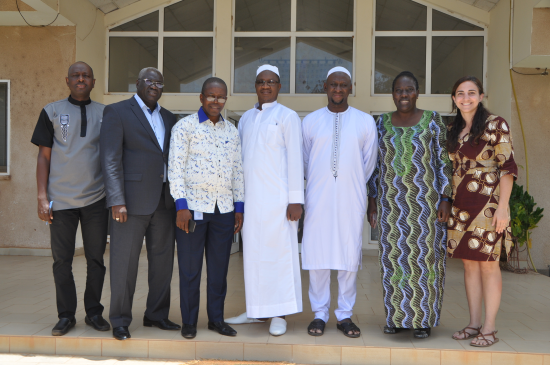
06 Aug Guinea goes SeneGambian: Cross-Border Collaboration for Cross-Cutting Malaria Solutions
In early May 2019, the Gambian National Malaria Control Program (NMCP) welcomed members of HRH2030’s Capacity Building for Malaria (CBM) activity and the Guinean NMCP for a study tour across the country, with the goal of sharing knowledge and building the foundation for future collaboration in the two countries’ fight against malaria.
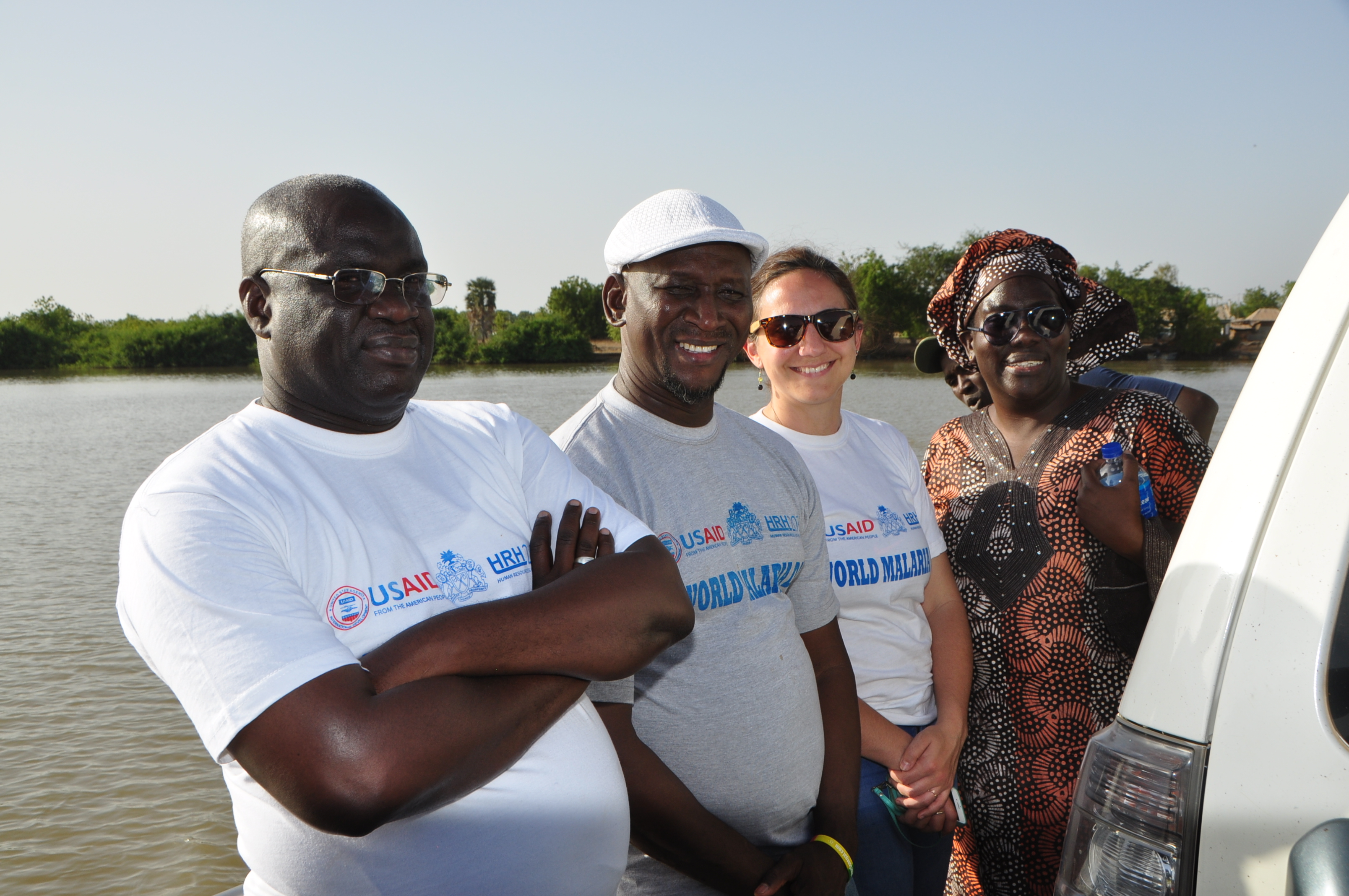
Wearing SeneGambian World Malaria Day celebration shirts, Guinea-Gambian study tour members cross the River Gambia into Senegal, at Jajanbureh, Central River Region, The Gambia.
Their trip included a SeneGambian World Malaria Day celebration and cross-border long-lasting insecticide net (LLIN) distribution campaign launch between Senegal and the Gambia, and site visits to local NMCP-supported health facilities and research sites in the field. With the Guinean travelers coming fresh from their own World Malaria Day celebration and LLIN mass-distribution campaign in late April, engaging with the Gambian team provided a unique opportunity for the two to compare strategies and share key technical knowledge at a time where they are both engaging in overlapping activities.
The tour began with a the LLIN campaign launch in a small Senegal-Gambia border community near Farafenni, called Kerr Ayib. Underneath giant World Malaria Day banners, the environment was complimented by schoolchildren singing national anthems, local talent dancing and performing short skits, with journalists, radio station personalities, and emcees from both sponsoring countries capturing and contributing to the experience. The event was also well attended by women and girls – reflecting the strong focus on providing LLINs to pregnant mothers and children under five – who are at greatest risk from malaria. Malaria in both Senegal and The Gambia has declined considerably over time, but the elimination of malaria in border areas often trails behind that of central areas – affirming this first-of-its-kind activity as especially unique and important to malaria elimination.
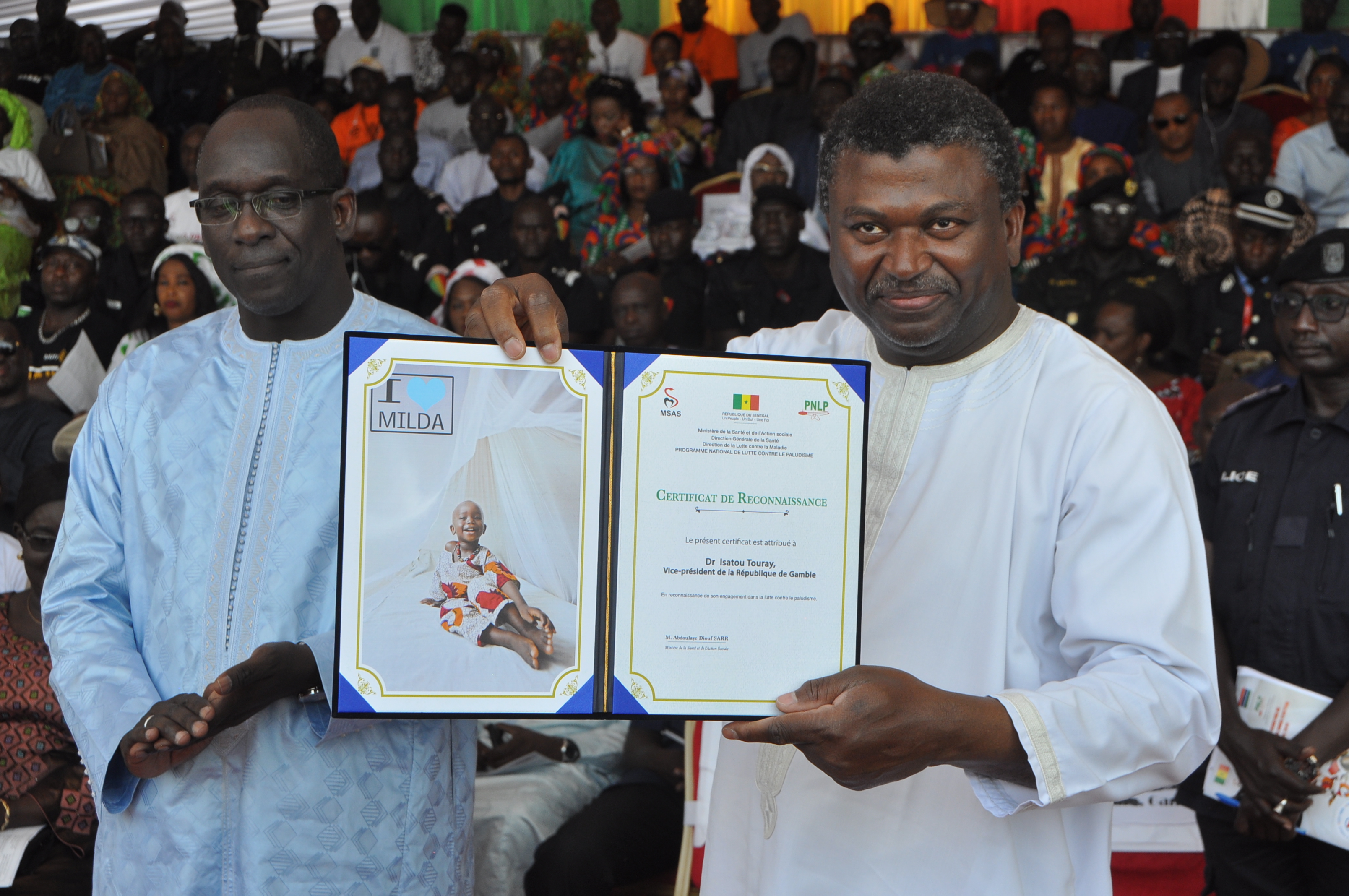
Senegalese Minister of Health Abdoulie Diouf Sarr (left) presents a certificate of recognition to Gambian Minister of Health Dr. Ahmadou Lamin Samateh (right) at the SeneGambian World Malaria Day celebration. The certificate honors the former Gambian Minister of Health and current Vice President, who had originally initiated and led the cross-border collaboration.
In the days after the celebration, the Guinean team traveled to the Upper River Region (URR) to visit the Regional Health Directorate (RHD) and a research facility of the London School of Hygiene and Tropical Medicine’s Medical Research Council (MRC) Unit, as well as select facilities used by the NMCP and MRC, a technical partner in the NMCP’s fight against malaria, as “sentinel sites” for epidemiological research.
At the RHD, they were welcomed by the regional health team. During their time in-person together, the Guinean and Gambian representatives discussed the use of malaria data collection best practices – including both countries’ reliance on WhatsApp groups for coordination and monitoring, and the challenge of collecting data from both public and private facilities and the communities. The Gambian team highlighted the importance of involving “village development committees” and community health workers in malaria programming across URR’s 368 communities and provided an overview of the recent struggle with malaria resurgence in the region.
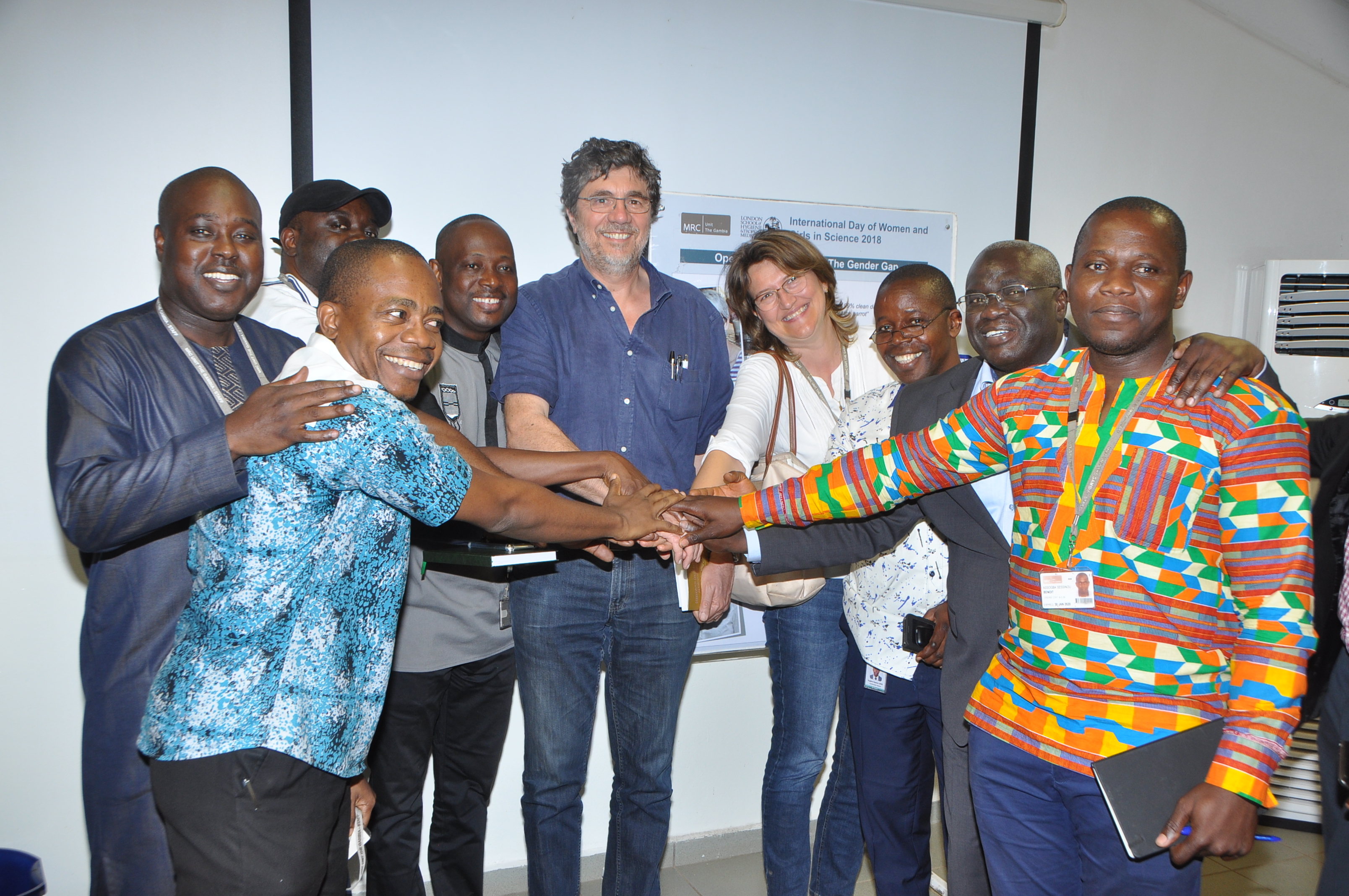
The Guinean NMCP team stand with MRC’s Prof. Umberto D’Alessandro (center) who provided information on malaria stratification and the generation of scientific evidence to drive policy.
From there, the study tour traveled to Basse District Hospital, where HRH2030-CBM interviewed two groups of women and children that had been affected by the deadly disease. The interviewees shared first-hand stories of their symptoms, the treatments they underwent, their recovery, the importance of prevention, and communicated their awareness of the NMCP and Ministry of Health’s informative communications campaigns to emphasize the use of insecticide-treated mosquito nets. One respondent underlined that the health clinics and hospitals are providing an important service to the community, but also highlighted the barrier of cost of acquiring anti-malaria drugs in the private sector. Interviewing patients and health workers for qualitative data about healthcare services is a critical step to gathering the necessary data to effectively respond to infectious disease.
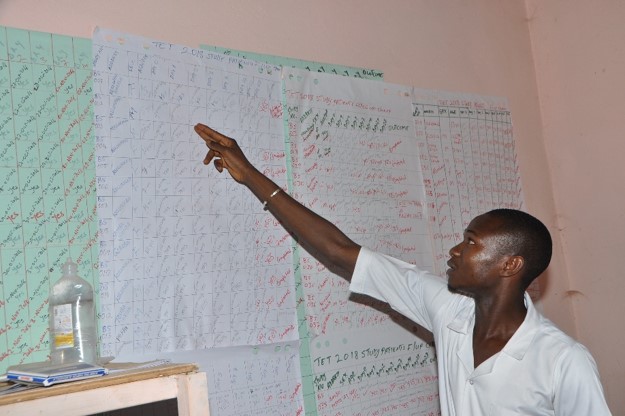
The In-Charge of Basse District Hospital discusses the outcome of the recent Therapeutic Efficacy Testing of antimalarials at the Basse District Directorate.
In addition to touring hospitals, clinics, and research sites, the study tour spent a significant amount of time discussing each country’s goals and strategies for 2020. In The Gambia, for example, the NMCP has had success in investing in DHIS2, a health-management data collection platform, as its primary malaria data repository, and is eager and available to support Guinea should they decide to transition to a similar approach.

HRH2030’s CBM Senior Technical Advisor Dr. Dorothy E. Onyango (left) chats with the Guinea NMCP Program Manager Dr. Eugene Kaman Lama (right) in Banjul.
These lessons learned shared between Guinea and The Gambia during this study tour, with input and guidance from HRH2030’s CBM activity, provided an opportunity to strengthen the bond between the two countries’ NMCPs – who have now laid the foundation for future exchange and cooperation in developing effective and efficient malaria control and elimination activities, and plan to continue evolving their respective research agendas in order to do so.
HRH2030’s CBM activity has been supporting the Gambian and Guinean NMCPs through the efforts of their two long-term technical advisors, Drs. Dorothy E. Onyango and Youssoufa Lo, respectively, who worked together to plan and implement this tour.
Header Photo: The Guinea-Gambian study tour team poses for a group photo outside the NMCP offices in Banjul, The Gambia. Pictured (from left to right): Guinea NMCP Monitoring and Evaluation Officer Dr. Nouman Diakite, CBM Guinea Senior Technical Advisor Dr. Youssoufa Lo, Guinea NMCP Program Manager Dr. Eugene Kaman Lama, NMCP Gambia Program Manager Balla Kandeh, Gambian NMCP Monitoring and Evaluation Specialist Momodou Kalleh, CBM Gambia Senior Technical Advisor Dr. Dorothy E. Onyango, and CBM Director Liz McGehee-Kiriakou. Credit: HRH2030 (2019)





